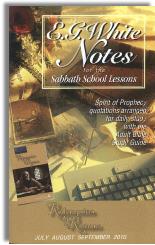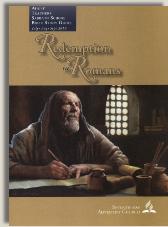|
||||||||||||||
Commentary on "Victory Over Sin"
Day 6: Thursday, August 19, 2010 - Delivered From Death
Overview
In Chapter 7, Paul was serving the law of sin in his body, today’s lesson states, so he calls his body, “the body of this death.” At the same time, God has revealed His will to Paul’s mind through the law. Now that the Holy Spirit has put him under conviction, Paul now consents that the law is good and is determined to keep it. He fails because he is trying to obey with Christ. As long as his body is under the power of sin’s law, it remains a “body of death” because it is in obedience to sin. “Serving sin and obeying its law means death.”
The lesson offers alternative interpretations of verse 25, where Paul summarizes the chapter,
“So then, I myself serve the law of God with my mind, but with my flesh I serve the law of sin.”
Though the lesson does not take a definite position about its meaning, it concludes that without Christ, we are helpless against sin. With Christ, we have new life characterized by victory, if we choose to claim God’s promises. The believer must be making these choices daily to surrender to Christ. No one can make those choices for him. There is “no other way to attain for yourself the victories that are promised in Jesus.”
Observations
Our sin problem would be so much simpler if sin were merely a set of behaviors that violate written laws. This lesson teaches that our bodies are called “bodies of death” because of the sinful actions we commit with our bodies. Therefore, if we can stop those behaviors and follow the Ten Commandments, with God’s help, we can be delivered from sin. Then we will no longer need to cry out with Paul, “Who shall deliver me from this body of death?”
This is salvation through behavior modification, and it completely misses the deep problem of sin. B-Mod theology has a trivial view of sin, an insipid view of God’s law, and an inflated idea of human achievement. Worst of all, the infinite cost of our salvation at the Cross is trivialized into moral influence theatre.
What then does Paul and the rest of scripture teach about this “law of sin?” We know that it begins in us before birth,
“Behold, I was brought forth in iniquity, and in sin did my mother conceive me.” (Ps. 51:5)
Near the end of his life, Paul called himself the “chief of sinners.” This law is a permanent condition until we obtain new bodies. We cannot remove the law of the flesh by changing our behavior, otherwise Paul would not have called it a “law.” Nomos, or law, refers to an operating principle which exercises control. The law of sin comes with the body we were born with.
So we cannot trivialize our condition if we are to find the real deliverance that is offered. We must first come to know the total futility of our efforts. Let’s look more closely at verse 24. Here Paul confesses his utter helplessness, and cries out in desperation,
“Wretched man that I am! Who will deliver me from this body of death?”
“Wretched” in the Greek suggests despair and exhaustion from the hard labor of trying to keep the law and please God. Paul has a deep appreciation for the grace of God and the cost of his salvation at the Cross. That is why he is anguished over his inability to respond with obedience to the law.
With his expression, “this body of death,” Paul used a macabre Illustration from the Roman penal system. They would punish a murderer by tying the victim’s rotting corpse to his back, permanently. No one was permitted to deliver him from that corpse. In our case, the ghastly menace we carry is the sin-infected body we live in. Physical bodies aren’t sinful intrinsically, but sin is the controlling principle in human bodies that wages war against God’s authority. This rebellion is a spiritual problem, not a physical one.
This “body of death” must remain attached to our real selves until we are delivered by our Lord, when we “put on our heavenly dwelling” (II Cor. 5:2). Until that moment, we must live in our “earthly tents” as we groan, longing for the heavenly body. The most painful aspect of living in this body is not physical illness, but its “law” which wars against us, making us “captive to the law of sin” (vs. 21). It is painful because followers of Christ have new spiritual life that hears His voice, and hates sin.
By the Holy Spirit’s conviction, we come to Christ with a humble and contrite spirit “that He will not despise” (Is. 57:15). First He awakens us to our desperate condition and gives us the gifts of conviction and repentance. He doesn’t abandon us to despair, but gives us new spiritual life, and “revives the spirit of the lowly,” resulting in the new birth. The one who comes to Him He will never cast out (Jn. 6:37). By the words of Jesus, He will never abandon you.
The lesson has weakened that assurance by pointing out that, just as no one can breathe or cough for us, we must choose for ourselves to surrender to Christ. We will experience deliverance from death only if we continuously make choices to “attain” for ourselves victory over sin.
We can’t forget that we all began life spiritually dead, enjoying life as slaves to our passions (Eph. 2:1-3). One day while we were still dead in our sins, God’s sovereign call came to us and made us alive together with Him (Eph. 2:5). This all happened before we were aware of it or deserved it. Being now alive, one of the gifts of the Spirit is a “freed will,” the ability to say no to the flesh and walk in the Spirit.
After Lazarus walked out of his tomb, he might have said, “It’s great to be alive, but it’s a good thing I chose to obey. I got up off my bed and walked out the door. No one could do that for me.” He could have convinced himself that his resurrection was a personal attainment, due to his good choices. But Jesus voice entered the tomb while Lazarus was quite dead, filling his corpse with obedience. His walking out of the tomb had already been decreed by the Life Giver. So it is with us; When He says to you “Follow Me,” He has already filled you with resurrection life.
“My sheep hear my voice, and I know them, and they follow me. I give them eternal life, and they will never perish, and no one will snatch them out of my hand.” John 10:27,28
Summary
- Our problem with sin is much more than just sinful behaviors.
- Sin is an operating principle of rebellion that resides in our bodies until death.
- Christ gives new life to us to obey Him when we despair of our law-keeping.
- Our surrender to Christ is part of the salvation already given by Christ.
- When Jesus says to you, “Follow Me,” He has already filled you with resurrection life.
Copyright 2010 BibleStudiesForAdventists.com. All rights reserved. Revised August 19, 2010. This website is published by Life Assurance Ministries, Glendale, Arizona, USA, the publisher of Proclamation! Magazine. Contact email: BibleStudiesForAdventists@gmail.com.
The Sabbath School Bible Study Guide and the corresponding E.G. White Notes are published by Pacific Press Publishing Association, which is owned and operated by the Seventh-day Adventist church. The current quarter's editions are pictured above.
Official Adventist Resources
Standard Edition Study Guide Week 8
Teacher's Edition Study Guide Week 8
Easy Reading Edition Study Guide Wk 8
Search the Complete Published Ellen G. White Writings


